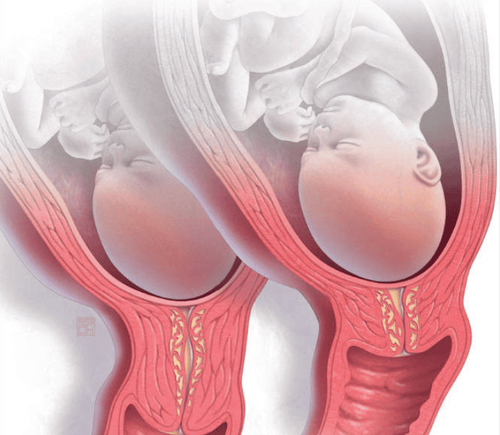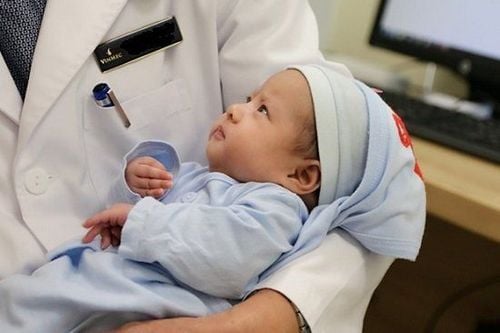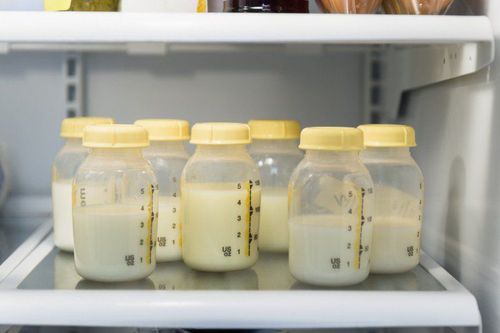Babies born at 33–36 weeks are considered premature. However, The outlook for babies born at this stage is highly positive, and with proper care, they can grow up healthy.
1. Causes of Premature Birth
Women with a healthy pregnancy can still be at risk of premature birth, while others with risks of complications may carry to full term. In cases where certain pregnancy issues affect the health of the mother, the fetus, or both, it may be necessary to end the pregnancy at that time. This is referred to as medically indicated preterm birth. Examples include preeclampsia, restricted fetal growth …
The most common causes of premature birth include:
- Multiple pregnancies, carrying more than one baby at the same time (e.g., twins or more)
- Uterine bleeding
- Stress
- Infections in the uterus or other parts of the body
Women who experience bleeding during pregnancy may also face a higher risk of premature birth. Mothers with a history of preterm birth or with less than two years between pregnancies are more likely to give birth prematurely. A short cervix or a history of surgeries on the uterus or cervix can also increase the risk of premature birth.
Certain lifestyle habits can lead to a baby being born at 33–34 weeks or even earlier. Smoking during pregnancy is a major cause of preterm birth, reducing the baby’s lung capacity and birth weight. Chronic stress in the mother is another risk factor.

2. Can a Baby Born at 33–36 Weeks Survive?
The closer a baby is born to the due date, the higher their chances of survival. At 36 weeks, a baby’s body is nearly fully developed, and they are usually ready to survive outside the womb. At week 34, many of the baby's bodily systems are not yet fully mature, especially the lungs. The lungs do not reach full development until around 36 weeks.
Neonatal Intensive Care Units (NICU) in most hospitals are well-equipped to help babies born at 34 weeks breathe independently. Many hospitals have trained staff to support late preterm infants and treat various health issues. In fact, babies born between 31 and 34 weeks generally have a survival rate of 95%, depending on other health conditions.
Trắc nghiệm: Thế nào là trẻ sơ sinh non tháng?
Trẻ sơ sinh non tháng rất cần được chăm và điều trị thật tốt để giúp giảm nguy cơ gặp phải các di chứng về tinh thần, vận động và sự phát triển sau này. Cùng theo dõi bài trắc nghiệm dưới đây để có thể nhận biết trẻ sơ sinh non tháng và có thêm kiến thức chăm sóc, nuôi dưỡng tốt nhất cho trẻ.The following content is prepared under supervision of Thạc sĩ, Bác sĩ y khoa, Ma Văn Thấm , Nhi , Phòng khám Đa khoa Vinmec Dương Đông(Phú Quốc)
3. Development of Babies Born at 33–36 Weeks
3.1 Development of Babies Born at 33–34 Weeks
Babies born prematurely at 33 to 34 weeks are referred to as "moderate preterm infants." Weighing between 1800–2200g and measuring nearly 50cm in length at birth, these babies are close in size to full-term infants. Although they are larger, 33–34-week preterm babies are not yet fully mature and may need to stay in the NICU for several weeks.
By weeks 33 and 34, preterm babies are almost fully developed. Their bones are fully formed, their fingernails reach the tips of their fingers, and in male babies, the testes have descended into the scrotum. However, their respiratory system will not fully mature until the later weeks of pregnancy, and antibodies only start being passed from the mother to the baby during the final months. This means the baby's immune system is still somewhat underdeveloped.
Preterm babies born at 33–34 weeks often require a short stay in the NICU and face minimal complications. They might need short-term respiratory support but may take longer to learn how to feed. The suck-swallow-breathe reflex at this stage is often uncoordinated, and these babies may not yet have the strength to absorb enough nutrients to grow and gain weight properly.
During this period, it’s important to watch for signs of overstimulation in the baby, such as hiccups, sneezing, crying, or arching their body. Ensuring the baby gets enough uninterrupted sleep is vital for their development.

3.2 Development of Babies Born at 35–36 Weeks
Babies born at 35–36 weeks are referred to as "late preterm infants." These babies are approximately 50 cm long and typically weigh between 2200 and 2600 grams. Although they look similar to full-term babies, they are still classified as preterm and may experience some issues related to prematurity.
At this stage, babies have reached their full length, are gaining weight rapidly, and have fingernails reaching the tips of their fingers as well as fully developed footprints.
Despite their resemblance to full-term babies, 35–36-week infants are still considered premature. Their lungs are not yet fully developed, and they may lack sufficient fat to stay warm or the energy needed to breastfeed or bottle-feed effectively. Protecting their sleep and allowing them to stay in the NICU until they are ready for discharge remains important.
During this period, babies move more smoothly and can bend their arms and legs easily. They can also turn their heads from side to side, and their muscle tone is stronger. Episodes of apnea (temporary pauses in breathing) are significantly reduced.
The baby's states become more distinct—deep sleep, light sleep, drowsiness, quiet and alert, awake and fussy, or crying. Although their awake periods remain short, they are becoming longer and more frequent. Babies can engage with their environment for longer periods and may turn their heads or close their eyes when full.
Babies at this stage are more likely to respond to sounds and external noises. You may notice how they react to the familiar voices of their parents. They may not cry much yet, but as they approach full-term, crying will become more frequent as a way to signal their needs. During this period, they may begin breastfeeding. While they may still be sensitive to touch and grasping, talking to them can help them relax over time.
4. Potential Complications in Babies Born at 33–36 Weeks
Although clinicians tend to focus on the obvious problems in babies born before 34 weeks, late preterm infants are also at risk of many disorders similar to those seen in younger preterm babies.
Compared to full-term infants, late preterm infants tend to have longer hospital stays and higher rates of readmission and diagnosed disorders. Most complications arise from the immature functioning of organ systems, similar to those in younger preterm infants, but the severity is generally lower than in earlier preterm cases.
However, some complications of prematurity, ( such as necrotizing enterocolitis, retinopathy of prematurity, bronchopulmonary dysplasia, and intraventricular hemorrhage ) are uncommon in late preterm infants. In most cases, complications are typically manageable and do not result in long-term sequelae.
Common Complications in Late Preterm Infants
- Central Nervous System: Episodes of apnea (temporary pauses in breathing)
- Gastrointestinal System: Poor feeding due to delayed maturation of sucking and swallowing mechanisms (the main cause of prolonged hospital stays and/or readmission)
- Hyperbilirubinemia: Caused by immature bilirubin metabolism in the liver and/or increased reabsorption of bilirubin in the intestines (e.g., feeding difficulties leading to reduced bowel movement)
- Hypoglycemia: Resulting from low glycogen stores
- Unstable Temperature: 50% of infants experience varying degrees of hypothermia (due to an increased surface area-to-volume ratio, reduced fat tissue, and ineffective heat production from brown fat)

5. Caring for Babies Born at 33–36 Weeks
Since babies born at 33–36 weeks are still at risk of complications from prematurity, they may require treatment in the NICU. This depends on their birth weight and overall health. Babies born to mothers who smoke, drink alcohol, or misuse substances are more likely to be born prematurely and face more health problems from birth.
Initial care for preterm and low-birth-weight babies begins in the hospital's NICU. Preterm babies often have weakened immune systems, making them more susceptible to illnesses than full-term babies.
Breastfed babies receive antibodies from breast milk, which can help them avoid illness more effectively. While breastfeeding is a personal choice, many hospitals provide lactation consultants to support mothers in caring for their babies effectively.
After discharge, it is important to feed the baby frequently to help them gain weight. Frequent pediatric checkups are crucial to track the baby’s growth and developmental milestones. If long-term complications arise due to prematurity, parents should consult specialists to ensure proper treatment and management of the condition.
To prevent common illnesses in newborns, parents should focus on nutrition that enhances the baby's immunity. Supplementing with lysine, essential trace minerals, and vitamins such as zinc, chromium, selenium, and B vitamins can help boost the immune system, reduce the risk of minor illnesses, and prevent digestive issues.
Parents can explore more about:
- Why Is It Important to Supplement Lysine for Children?
- The role of zinc and guidelines for proper zinc supplementation
Visit Vinmec.com regularly to access useful information for caring for your baby and family.
To arrange an appointment, please call … or make your reservation directly HERE. You may also download the MyVinmec app to schedule appointments faster and manage your reservations more conveniently.















